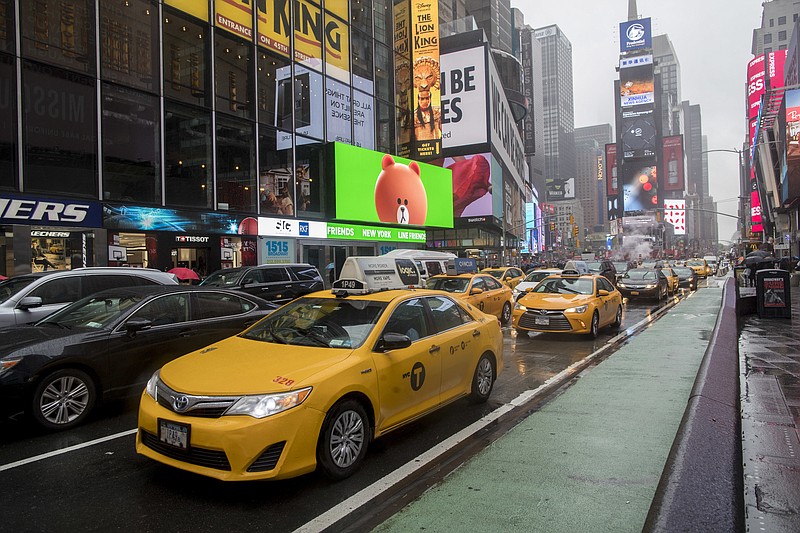NEW YORK (AP) - Is it time to get cars out of the Crossroads of the World?
The vehicle rampage that killed a teenage tourist in New York's Times Square this month has prompted conversations whether the city should still be allowing cars, cabs and trucks to cruise down the neon-lit blocks where huge crowds of people gather daily to buy theater tickets, gawk at street performers and marvel at the crush of humanity.
Vehicles were banished from Broadway where it passes through the square eight years ago. Some city officials and traffic experts say the ban should be expanded to include the north-south artery Seventh Avenue, turning Times Square into a series of pedestrian plazas.
"The vulnerability of Times Square was made scarily apparent during the most recent attack and I think there has to be a conversation about closing this area to regular traffic," said City Councilman Ydanis Rodriguez, a Manhattan Democrat. "This is one of the most highly trafficked areas in the world for tourists and we can't have it remain a soft spot for those with the worst intentions."
Known around the world for the New Year's Eve ball drop, Times Square is crowded most days with tour groups, costumed characters, sightseeing bus hawkers and office workers. Foot traffic slows to a crawl when Broadway theater-goers spill out. Taxis, buses, delivery trucks and private cars clog the streets.
Police say Richard Rojas, a Bronx man who had been discharged from the Navy, was high on PCP when he took a U-turn off Seventh Avenue and plowed down sidewalks leading into Times Square for three blocks on May 18, killing 18-year-old Alyssa Elsman, of Portage, Michigan, and injuring 22 others.
Rojas, 26, was charged with murder and attempted murder and is being held pending a July 13 arraignment. An attorney for Rojas did not return a call seeking comment.
While police say there are no indications that Rojas was inspired by any militant ideology, Times Square was also targeted in 2010 by would-be terrorist Faisal Shahzad, who built a powerful car bomb that failed to detonate. Shahzad is serving life in prison for that failed attack, which authorities said could have killed hundreds if his bomb had gone off.
Temporary concrete barriers were installed along the Seventh Avenue sidewalk after the May 18 carnage while city officials weigh a long-term solution. That could involve installing more steel posts along the avenue, called bollards, like the ones that eventually halted the progress of Rojas' car.
"We're now sitting down and having a deeper discussion about what are the right design elements, where might we put bollards, what are the ways we can make sensible protections, but also hopefully keeping the space somewhat inviting and attractive for pedestrians," city Transportation Commissioner Polly Trottenberg said.
Trottenberg said closing Seventh Avenue to cars in the Times Square area "is certainly one of the things that's being discussed." She said the police counterterrorism unit will "set the priorities" for any Times Square traffic restrictions.
David C. Kelly, now an associate managing director of K2 Intelligence in New York City who was formerly the New York Police Department's assistant commissioner for counterterrorism, said banning traffic is attractive from a security standpoint but would need to be carefully planned.
Kelly noted that when the area around the New York Stock Exchange in lower Manhattan was closed to cars, a garage owner filed a lawsuit arguing that his livelihood would suffer. "You would have to consider the commercial impact," Kelly said.
Former Mayor Michael Bloomberg, an independent, moved in 2009 to close Broadway to cars and create pedestrian plazas at Times Square and also several blocks south at Herald Square.
Officials said traffic in both areas would flow more smoothly without cars on Broadway, which runs diagonally and creates awkward turning angles.
The car ban also helped turn Time Square into "one of the most vibrant public spaces in New York City," said Alyssa Pichardo, senior planner for transportation at the Regional Plan Association. "It's not just a place where people congregate on New Year's Eve," she said.
Pichardo and David Burney, a professor of urban planning at Pratt Institute who served as Bloomberg's commissioner of design and development, believe it may now be time to ban cars from Seventh Avenue at Times Square as well.
Burney said it would have been "a bridge too far" to close both Broadway and Seventh Avenue in 2009. But he said closing Seventh to cars between 42nd and 47th streets would create needed space for pedestrians.
"When you think of the overwhelming number of pedestrians who use the space, they need more room," he said. "Too much room is being taken by vehicles."
Cars should still be allowed on the east-west streets, Burney said.
Pichardo said the car rampage reinforces her organization's support for further car restrictions in Times Square. "Sadly, this tragedy has highlighted the need to expand the pedestrianization of Times Square," she said.
Pichardo said one possibility would be to allow cars on Seventh Avenue early in the morning so businesses can receive deliveries, then turn the avenue over to foot travelers.
Burney said that with Seventh Avenue closed off, cars "will find other places to go."
Others are skeptical.
Livery cab driver Tony Hyseni said he would not favor banning cars from more Times Square streets.
"Everything that happens with traffic is killing us," he said. "You're moving slowly and losing time, money and everything."
Pedicab driver Azamat Nuguspanov was dubious as well.
"The whole midtown would be traffic," he said. "If they're going to close it they will have more trouble."
___
Associated Press writer Colleen Long contributed to this story.
